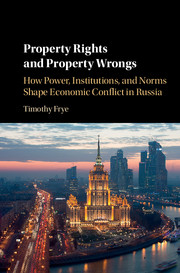 Property Rights and Property Wrongs
Property Rights and Property Wrongs Book contents
- Frontmatter
- Contents
- List of figures
- List of tables
- Acknowledgments
- Note on the text
- 1 Introduction
- 2 Power and Property
- 3 Autocratic Elections and Property Rights
- 4 Courts and Connections
- 5 Reputation and the Rule of Law
- 6 Social Norms and the Banker's Gold Watch
- 7 Conclusion
- Data Appendix
- References
- Index
4 - Courts and Connections
Published online by Cambridge University Press: 31 March 2017
- Frontmatter
- Contents
- List of figures
- List of tables
- Acknowledgments
- Note on the text
- 1 Introduction
- 2 Power and Property
- 3 Autocratic Elections and Property Rights
- 4 Courts and Connections
- 5 Reputation and the Rule of Law
- 6 Social Norms and the Banker's Gold Watch
- 7 Conclusion
- Data Appendix
- References
- Index
Summary
Who's The Boss: We or the Law? We are Masters over the Law, not the Law over Us – so we have to change the law; we have to see that it is possible to execute these speculators.
Nikita Khrushchev, 1961 (Simis 1982: 30)Political scientists, economists, and sociologists disagree on many things, but they agree that capable public institutions such as police and courts are central to strong property rights and economic development. For Tilly (1992), the relationship between state agents of coercion and private agents of capital largely determined the economic fate of states in Europe over the last millennium. For North (1981; 1990), capable state institutions, such as courts and bureaucracies, that constrained rulers from arbitrary seizures of property, boosted trade between private entities and created a more level playing field, drove the industrial revolution and the rise of the West. For Rauch and Evans (2000), meritocratic bureaucracies distinguished the leaders from the laggards among lower- and middle-income countries over the last quarter century. This chapter focuses on one state institution: the courts. As arbiters of disputes over property, courts are a key public institution whose performance has shaped economic development for better and worse from Japan to Egypt and Argentina to China (West 2005; Moustafa 2008; Helmke 2005; Landry 2008).
The conventional wisdom is that courts and other state institutions responsible for protecting property rights in Russia are notoriously corrupt, inefficient, and weak. This view is prevalent not only in the media and popular commentary on Russia, but is also held by some academics as well (Burger and Sorokina 2003; Holmes 2003; Satarov 2003; Ledeneva 2006; Lambert-Mogiliansky et al. 2007). In the absence of reliable courts, this conventional wisdom suggests that Russian businesses rely heavily on informal practices, such as turning to personal contacts within the state, bribing court officials, or paying the security forces to resolve economic disputes.
As I detail later in the chapter, however, some academic studies have put the courts in a more favorable light. These scholars tend to emphasize Russia's legal dualism – a legal system that works passably for routine cases, but is little help in high-stakes or politically charged cases.
- Type
- Chapter
- Information
- Property Rights and Property WrongsHow Power, Institutions, and Norms Shape Economic Conflict in Russia, pp. 101 - 137Publisher: Cambridge University PressPrint publication year: 2017


